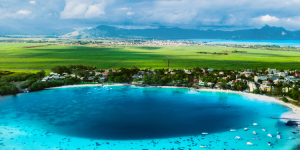
“Well-being”, “quality of life” “serenity” and other factors for “personal development” are some of the main questions expats and expats-to-be have been asking themselves in these times of border reopenings. These are often associated with a stronger desire for nature, the outdoors, simple pleasures. But has the quality of life changed since the pandemic? What do expats aspire to now?
The perception of happiness around the globe
The pandemic has had an undeniable impact on the quality of life in most countries. Before studying the consequences of Covid-19 on global happiness (the report will be released next year), Pierre Le Roy, a former adviser to the French Ministry of Agriculture, analyses the current situation. According to him, there has been a 27% rise in the global happiness index since the year 2000. However, figures are logically expected to drop significantly with the pandemic and ongoing restrictions. Created on a voluntary basis in the 2000s, the World Happiness Index intends to overcome the limits of the GDP, which only assesses the wealth produced by a country without considering the environment, the quality of life, democracy, freedom of the press, etc. The UN and the OECD focus more on the quality of life. In the latest global report published by the Sustainable Development Solutions Network, the UN questions subjective well-being and ranks Finland as "the world's happiest country". Next come Denmark, Switzerland, Iceland and the Netherlands. Unsurprisingly, Scandinavia top the ranking. Pierre Le Roy's index is quite similar. Conversely, politically and economically unstable countries with very strict state control come at the bottom of the ranking. For instance, Russia ranks 76th and China 84th. So it's clear the pandemic alone is not responsible for these poor rankings, but it does make things worse. The Covid-19 pandemic has questioned the ecosystem of entire populations.
What is the impact on quality of life?
In 1993, the WHO defined quality of life as "the perception that individuals have of their place in life, in the context of the culture and the value system they live in, in relationship with their goals, expectations, standards and concerns. So it is a very broad concept that can be influenced in a complex way by the physical health of an individual, their psychological state and their level of independence, their social relations and their relation to the essential elements of their environment ".
Objective criteria, such as per capita GDP, healthy life expectancy, mortality rate, suicide rate, access to healthcare, etc., are therefore integrated into the concept of quality of life: the feeling of well-being, peace, good psychological health. On this last point, expatriates are, paradoxically, rather optimistic. According to recent media reports, two-third of expats believe they have a good quality of life. The most satisfied expats live, unsurprisingly, in Scandinavian countries but also in Southeast Asia, Australia, and Canada. They were well integrated into their country of adoption before the global health crisis, and they are still living there and enjoying their living environment in a different way. Obviously, Covid-19 has had effects, including negative effects. Expats have, however, seized the opportunity to appreciate their life, set new goals, and rediscover their host country.
Redefining relationships with work, space and time
It's not always easy to appreciate your quality of life when work takes up most of your time. The unprecedented global lockdown of March 2020 forced the world to suddenly slow down; life almost came to a standstill. The consequences included technical unemployment, job loss, the feeling of loss of control and uncertainty generating anxiety, mental illnesses (or aggravation of these). The cataclysm is still shaking the populations around the world. Health workers are carrying a heavy burden, and practitioners are increasing the number of teleconsultations. The world is trying to get back to normalcy with the hope of redefining its relationship to work, space and time. Individuals are reappropriating their immediate environment to better assess their relationship to material things.
Paradoxically, the pandemic has been a driving force for many. According to Forbes, 1 in 4 Americans are preparing to change jobs. For them, the current crisis is an opportunity to change jobs, challenge themselves, and boost their career. The Covid pandemic can thus be a springboard to seize new opportunities, fulfil a life project, discover and appreciate remote working, organize one's life differently, or start a business. Work is now integrated into a whole 'closer to the environment concept'. People want to escape stress and devote more time to their own well-being and that of their loved ones.
Redefining your relationship with nature
Dr Tedros Adhanom Ghebreyesus, Director-General of WHO, drew his first conclusions as early as May 2020. “The pandemic reminds us that humanity and the planet have an intimate and delicate relationship. All efforts to make our world safer are doomed to failure if they do not address the crucial interface between humans and pathogens and the existential threat of climate change, which makes our planet less habitable”.
Since the quality of life also depends on the state of the planet, individual and collective initiatives are multiplying to preserve nature. The pandemic has raised awareness of how interdependent individuals are. In Kenya, the start-up Koko manufactures bioethanol - ecological fuel - so that the inhabitants abandon wood, a traditional fuel widely used in cooking. However, the entire African continent is threatened by deforestation. The United Nations Environment Program (UNEP) is promoting this approach which could reduce pollutant emissions by 40 to 60%. Also in Kenya, the start-up Asobo rents electric motors to fishermen. The objective is to stop the use of fuel and preserve Lake Victoria, the world's second-largest freshwater reserve, where some 200 species of plants and animals are threatened. Morocco intends to increase its production of renewable energies from 11% in 2019 to 40% in 2035. Quality of life also depends on a better quality of the environment.
Better relationships with oneself and others
The health crisis has compelled individuals to replace themselves, no longer considering themselves as a whole but as the links of a chain. The strength of the chain depends on the strength of each link. Sport, balanced diet, relaxation, gardening, etc., have become more important, and time has become precious. Everyone takes advantage of their new way of managing their time for better interaction with others. Expats and locals alike are rediscovering their immediate environment. This is an opportunity to learn more about your own culture and that of others. Living together is experienced on a daily basis, in phone calls, videoconferences with relatives, contacts with neighbours, volunteering, etc. All these everyday actions are often carried out without taking notice and contribute to the well-being and improve the quality of life.
Quality of life is appreciated every day. However, the overabundance of anxiety-inducing information tends to stifle each individual's own feelings. This is an example of the feeling of insecurity felt by populations who, objectively, admit to not being subjected to any situation of insecurity. Taking a step back often allows you to look at yourself and your environment from another angle, allowing you to redefine a life plan, consider a move abroad or live your expat life differently, bounce back professionally, gain serenity.



















